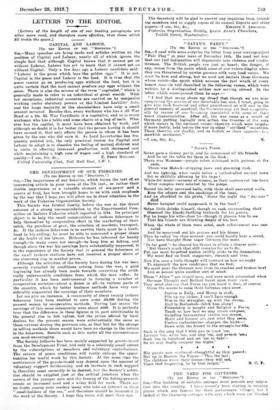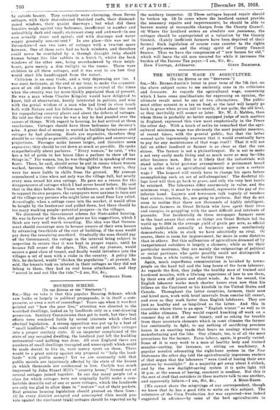THE NEED FOR COTTAGES.
[TO THE EDITOR Or THE " SPECTITOR."] SIR,—The building of suitable cottages must precede any migras tion into the country. I have recently been staying in country places which are fainous for their picturesque villages, but i looked at the charming cottages with eyes which were not blinded by outside beauty. They certainly were charming, those Devon cottages, with their dun-coloured thatched roofs, their diamond- paned windows, their quaint doorways ; but what did these beauties weigh against tiny bedrooms, insufficient in number and unhealthily dark and small; staircases steep and awkward—in one case actually stone and spiral; and with drainage and water supply generally non-exiztenty In one place—this was not in Devonshire—I saw two rows of cottages with a two-foot space between. One of these rows had no back windows, and therefore could never be ventilated by a through draught (why should human beings live like rabbits in a hutch ?), whilst the back windows of the other row, being overshadowed by their neigh- bours, gave merely a dim twilight to the rooms. There were children in all these cottages, and it was easy to see how they would start life handicapped from the outset.
Criticism is an easy trade, and a very depressing one too. I was most fortunate, at the end of my tour, to make the acquaint- ance of an old yeoman farmer, a genuine survival of the times when the country was far snore thickly populated than at present. He was a man whom Charles Kingsley would have delighted to know, full of observation, keenly interested in politics, and wise with the genial wisdom of a man who had lived in close touch both with Nature and his fellow-men. We talked about the need for repopulating country places and about the defects of cottages. He told rile that ever since he was a boy he had puzzled over the • causes of things. With regard to housing, he had arrived at these conclusions. Cottages should have three bedrooms for decency's sake. A great deal of money is wasted in building farmhouses and cottages by bad planning. Roofs are expensive, therefore they should be as simple as possible, avoiding all gables and unnecessary projections. Passages make houses larger, and therefore more expensive; they should be cut down as much as possible. He spoke sympathetically about parlours. "Every woman," he said, " who laas a bit of pride in her house likes a parlour to show off her things in." For women, too, he was thoughtful in speaking of stone floors. These, he said, should never be put in rooms where women worked, because, their clothing being lighter than men's, they were far more liable to chills from the ground. My yeoman remembered a time when not only was the village full, but nearly every man owned his own cottage. Ile gave me a reason for the disappearance of cottages which I had never heard before. He said that in the days before the Union workhouses, as each village had to support its own paupers, the ratepayers were anxious to turn out ef the village any persons who might later on need Poor Law relief. Accordingly, when a cottage came into the market, it would often be bought by the landowner and pulled down, lest there should be too many working people—potential paupers—in the villages.
We discussed the Government scheme for State-aided housing. He was in favour of the idea, and gave me his suggestions, which I think are very well worth recording. His idea was that Govern- ment should encourage men to become owners of their own houses by advancing two-thirds of the cost of building, if the man would pay down the remaining one-third. Gradually the man should pay off the Government, the cottage in the interval being subject to inspection to secure that it was kept in proper repair, until he became full owner of the place. This, said my yeoman, would ensure a good class of tenant, and finally would introduce into the villages a set of men with a stake in the country. A policy like this, he declared, would "thicken the population"; at present, he said, the tenants took no interest in their cottages as they did not belong to them, they had no real home attachment, and they "moved in and out like the tide."—I ani, Sir, &c., GEORGINS HOME.



























 Previous page
Previous page